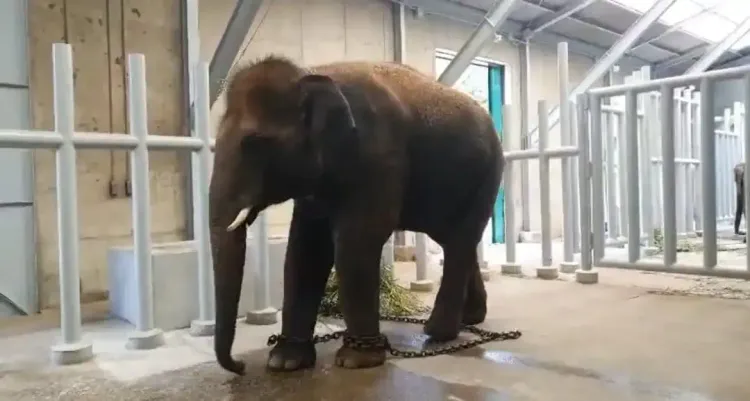Have Karnataka Elephants Found a New Home in Japan?

Synopsis
Key Takeaways
- Four elephants relocated to Japan from Bannerghatta Biological Park.
- Successful airlift via Qatar Airways cargo aircraft.
- Elephants underwent three months of specialized training.
- Future exchange includes rare species to India.
- Collaboration between the Central Zoo Authority and embassies.
Bengaluru, July 26 (NationPress) In a groundbreaking international move, four elephants from Bannerghatta Biological Park have been successfully transported to Japan, embarking on an exciting new journey. The authorities at Bannerghatta Biological Park shared footage of the elephants being transported in trucks, resting, and enjoying their meals in their new enclosures in Japan.
The four magnificent pachyderms - Suresh (8), Gauri (9), Shruti (7), and Tulsi (5) - were airlifted from Kempegowda International Airport in Bengaluru to Kansai International Airport in Osaka on July 24, via a Qatar Airways B777-200F cargo aircraft.
After an extensive journey of over eight hours, they safely arrived in Japan on Friday.
They were then transported in specially designed cages by road to their new home at Himeji Central Park.
A dedicated team from Bannerghatta Biological Park accompanied the elephants throughout their journey, ensuring their comfort and safety. Now in Japan, the elephants are beginning to explore their new surroundings freely in the spacious natural enclosures of Himeji Central Park, marking the start of an exciting new phase in their lives.
In preparation for this significant relocation, the elephants underwent a rigorous three-month training program. A committed team consisting of two veterinary officers, four mahouts, a supervisor, and a biologist accompanied them and will remain in Japan for 15 days to assist the elephants in adjusting to their new environment.
The park is anticipated to soon welcome rare species, including cheetahs, jaguars, pumas, chimpanzees, and capuchin monkeys, in exchange for elephants from Japan, providing wildlife enthusiasts a chance to observe exotic animals in enriched habitats.
This exchange, which has been in the works since 2023, was facilitated through cooperation between the Central Zoo Authority, the Embassies of Japan and India, and various other governmental departments.
Bannerghatta Biological Park was established as a designated section of Bannerghatta National Park (BNP) in 2002. Located near Bengaluru city, within the Anekal range of Karnataka, Bannerghatta National Park spans across two districts: Bengaluru Urban and Bengaluru South. It was declared a National Park in 1974.
The park plays a crucial role as a wildlife corridor for elephants, linking the BR Hills and the Sathyamangalam forests. It is adjacent to the Talli Reserve Forest in the southeast and the Bilikal Forest in the south.
Additionally, Bannerghatta Biological Park is noteworthy for being the first biological park in India to establish a fenced, forested elephant sanctuary. In 2006, it became home to India’s first butterfly enclosure.





